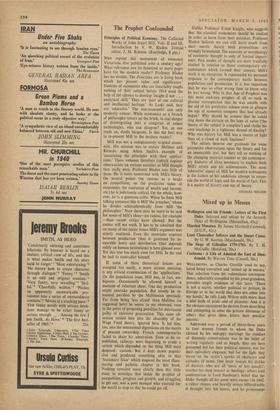The Prophet Confounded
Principles of Political Economy. The Collected Works of John Stuart Mill, Vols. II and III. Introduction by V. W. Bladen. Textual editor, J. M. Robson. (Routledge, 8 gns.)
WIIY reprint this monument of economic Victoriana first published over a century ago? What relevance can its thousand or more pages have for the modern reader? Professor Bladen has no doubts. The Principles are 'a living book which has present value and significance.' Students of economics who are invariably taught nothing of their subject before 1914 need the help of the classics to develop 'insight if not . . . analytical skill.' They are 'part of our cultural and intellectual heritage.' As Laski said, they are 'educative.' The non-economist can only modestly concur. While economics as a branch of philosophy totters on the brink, in real danger of disintegrating into a congeries of minor technologies, who cart disagree? Yet, as one reads on, doubt burgeons. Is this the best way to re-present Mill to the modern reader?
Mill was not a conspicuously original econo- mist. His mission was to restate Malthus and Ricardo using Adam Smith's example of 'associating the principles with their applica- tions.' These volumes therefore contain copious observations on various societies as Mill thought they really were. Professor Bladen says little of them. He is more concerned with Mill's theory. On several points (on custom as a brake on competition, on the predictive value of economics, the confusion of wealth and income, etc.) he is judiciously critical. On the whole, how- ever, he is a generous critic. When he finds Mill talking nonsense this is Mill 'the preacher,' whom he divides schizophrenically from Mill 'the philosopher.' Now there may be more to be said for some of Mill's ideas—on capital, for example —than recent critics have allowed. But the excuse will not wash. It has to be admitted that on many of the major issues Mill's argument was utterly confused. Even the notorious contrast between production (that is governed by in- exorable laws) and distribution (that depends solely on human institutions) is here glossed over. Yet this was too much even for Mill. In the end he had to contradict himself.
If some of these theoretical lesions are accepted too easily, a more serious omission is any critical examination of the 'applications.' On the population issue, Mill was, in fact, am- biguous. Occasionally he allowed himself a moment of reluctant cheer. One day production might overtake population. But mostly he re- mained petrified by the Malthusian spectacle. Far from being 'less afraid' than Malthus (as suggested here) he seems to me obsessed, even to the point of proposing penalties for miscreants guilty of excessive procreation. This same ob- session misled him into the absurdity of the Wage Fund theory, ignored here. It led him, too, into the sentimental digressions on the merits of peasant ownership. French contemporaries failed to share his admiration. Even as he re- published, railways were beginning to erode a system which depended on the thing Mill most despised: custom. But it kept down popula- tion and produced something akin to that 'Stationary State' which inspired the most illum- inating and pathetic chapter in this book. Nothing revealed more clearly than this little essay in nostalgia that inside the prophet of competition, progress and growth, and struggling to get out, was a poet manque. who yearned for the world to stop so tha' he could get off. Unlike Professor Frank Knight, who suggests that the classical economists should be studied in order to learn from their mistakes, Professor Bladen believes we can still learn much from their merits. Surely both propositions are wrongly formulated. The anatomy or morphology of economic thought is only of limited import- ance. Past modes of thought are most fruitfully studied in relation to those contemporary cir- cumstances which formed their context. Mill's work is no exception. It represented his personal response to the contemporary battle between population and production. It is less important that he was so often wrong than to know why he was wrong. Why in that Age of Prophets was this most cocksure prophet of all so sunk in gloomy retrospection that he was unable with the aid of his predictive science even to glimpse the age of economic conquest that had already begun? Why should he assume that he could ring down the curtain on the laws of value ('the theory of the subject is complete') and clothe his own teachings in a righteous shroud of finality? Why was history for Mill less a source of light than of a cloud of dark fixations?
The editors deserve our gratitude for some perceptive observations upon the theory and for an impeccable text, but they tell us nothing of the changing material context or the contempor- ary dialectic of ideas necessary to explain both Mill's errors and his achievements. The most 'educative' aspect of Mill for modern economists is the failure of his ambitious attempt to recon- cile the world of logic and the world of fact. This is a matter of history and not of theory.
CHARLES WILSON


































 Previous page
Previous page